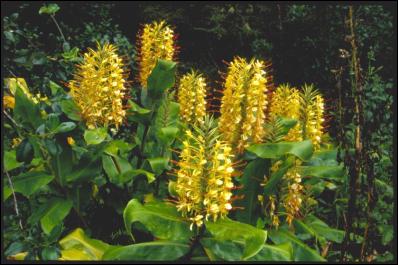"Ginger man" visits New Zealand
"Ginger man" visits New Zealand
A world expert on the biological control of a troublesome weed has arrived in New Zealand, bringing hope of a new weapon to combat the pesky plant. Wild ginger (Hedychium gardnerianum), also known as Kahili ginger, was originally grown in New Zealand as a garden plant.

It was first found in the wild in the 1940s, and is now a serious weed in native bush, forming dense stands that smother plants and prevent native seedling regeneration. The weed is most troublesome in North Island forests and the warm northern regions of the South Island. It is equally destructive in Hawaii, where it has invaded native Hawaiian rain forests.
Rob Anderson is a world-renowned expert on the biological control of wild ginger from the United States Geological Survey's Pacific Island Ecosystems Research Center in Hawaii. Mr Anderson has been researching the use of a bacterium (Ralstonia solanacearum), which occurs naturally in Hawaii, as a biological control agent for Kahili ginger. He will be in the country until next Friday to see New Zealand wild ginger first hand, and to talk with Landcare Research scientists and regional council biosecurity staff.
Landcare Research technician Alison Gianotti says Mr Anderson's experiments in the glasshouse and at field sites in Hawaii have shown that the bacterium can cause a devastating wilt disease of Kahili ginger. "In our talks with Rob, we will explore the possibilities of using the bacterium against wild ginger in New Zealand.
"In both Hawaii and New Zealand, biological control agents, such as bacteria, insects or fungi, offer the only practical way of managing large wild ginger infestations. Getting rid of the weed by hand or using chemicals is only feasible in small infestations, and may result in damage to nearby desirable plants.
"Samples of New Zealand wild ginger have already been sent to Hawaii, and Rob will test them to see if his bacterium is equally successful at killing wild ginger from here.
"If it is, then as one of the next steps we would like to embark on further testing in Hawaii to make sure the bacteria will affect wild ginger, and will NOT affect other plants of importance to New Zealand.
"Many further tests would need to be done to assess whether the bacterium would be suitable for use within New Zealand."
As well as meeting with Landcare Research scientists, Mr Anderson will be exchanging ideas and visiting field sites with biosecurity staff from the Auckland Regional Council, Northland Regional Council, Environment Waikato, Horizons Regional Council, Greater Wellington, Marlborough District Council, and the Tasman District Council.
His trip is
being sponsored by Landcare Research and the Secretariat for
Conservation Biology, Honolulu, Hawaii as part of the
Hawaii-New Zealand Exchange Programme.


 PSA: PPPs Pose Risks To New Zealand Workers
PSA: PPPs Pose Risks To New Zealand Workers Office of the Privacy Commissioner: New Research Shows Business Leaders Fear Being On The Hook For Others’ Privacy Breaches
Office of the Privacy Commissioner: New Research Shows Business Leaders Fear Being On The Hook For Others’ Privacy Breaches E Tū: E Tū Members Send Open Letter To James Grenon And NZME Board
E Tū: E Tū Members Send Open Letter To James Grenon And NZME Board Commerce Commission: Commission Calls For Comments On Copper Access Deregulation
Commerce Commission: Commission Calls For Comments On Copper Access Deregulation New Zealand Association of Scientists: NZAS Supports Saving Biotechnology Capacity In Callaghan; Asks What Now For Applied Technology Group
New Zealand Association of Scientists: NZAS Supports Saving Biotechnology Capacity In Callaghan; Asks What Now For Applied Technology Group Stats NZ: Business Employment Data - December 2024 Quarter
Stats NZ: Business Employment Data - December 2024 Quarter



